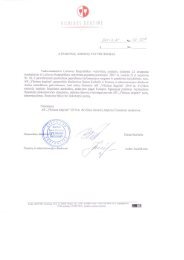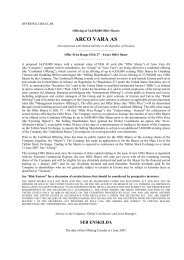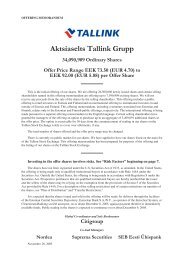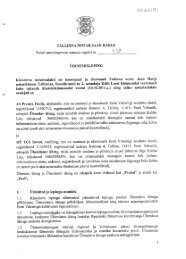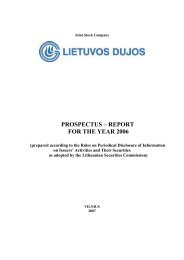AB „SNAIGĖ“ - NASDAQ OMX Baltic
AB „SNAIGĖ“ - NASDAQ OMX Baltic
AB „SNAIGĖ“ - NASDAQ OMX Baltic
Create successful ePaper yourself
Turn your PDF publications into a flip-book with our unique Google optimized e-Paper software.
Consolidated annual report for year 2008<br />
PRINCIPLES/ RECOMMENDATIONS<br />
4.12. Nomination Committee.<br />
4.12.1. Key functions of the nomination committee should<br />
be the following:<br />
• Identify and recommend, for the approval of the collegial<br />
body, candidates to fill board vacancies. The nomination<br />
committee should evaluate the balance of skills, knowledge<br />
and experience on the management body, prepare a<br />
description of the roles and capabilities required to assume a<br />
particular office, and assess the time commitment expected.<br />
Nomination committee can also consider candidates to<br />
members of the collegial body delegated by the shareholders<br />
of the company;<br />
• Assess on regular basis the structure, size, composition<br />
and performance of the supervisory and management<br />
bodies, and make recommendations to the collegial body<br />
regarding the means of achieving necessary changes;<br />
• Assess on regular basis the skills, knowledge and<br />
experience of individual directors and report on this to the<br />
collegial body;<br />
• Properly consider issues related to succession planning;<br />
• Review the policy of the management bodies for selection<br />
and appointment of senior management.<br />
4.12.2. Nomination committee should consider proposals<br />
by other parties, including management and<br />
shareholders. When dealing with issues related to<br />
executive directors or members of the board (if a<br />
collegial body elected by the general shareholders’<br />
meeting is the supervisory board) and senior<br />
management, chief executive officer of the company<br />
should be consulted by, and entitled to submit proposals<br />
to the nomination committee.<br />
4.13. Remuneration Committee.<br />
4.13.1. Key functions of the remuneration committee should<br />
be the following:<br />
• Make proposals, for the approval of the collegial body, on<br />
the remuneration policy for members of management bodies<br />
and executive directors. Such policy should address all<br />
forms of compensation, including the fixed remuneration,<br />
performance-based remuneration schemes, pension<br />
arrangements, and termination payments. Proposals<br />
considering performance-based remuneration schemes<br />
should be accompanied with recommendations on the<br />
related objectives and evaluation criteria, with a view to<br />
properly aligning the pay of executive director and members<br />
of the management bodies with the long-term interests of<br />
the shareholders and the objectives set by the collegial body;<br />
• Make proposals to the collegial body on the individual<br />
remuneration for executive directors and member of<br />
management bodies in order their remunerations are<br />
consistent with company’s remuneration policy and the<br />
evaluation of the performance of these persons concerned.<br />
In doing so, the committee should be properly informed on<br />
the total compensation obtained by executive directors and<br />
YES/NO<br />
/NOT<br />
APPLIC<strong>AB</strong>LE<br />
COMMENTARY<br />
NO Not formed (explanation in item 4.7.).<br />
NO Not formed (explanation in item 4.7.).<br />
Prepared by U<strong>AB</strong> FMĮ „Orion Securities“ p. 49





